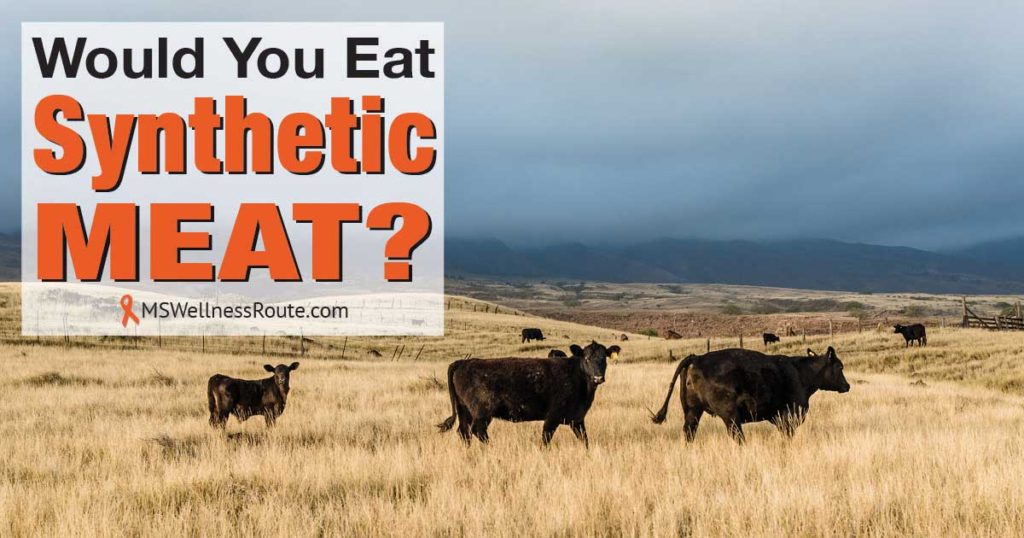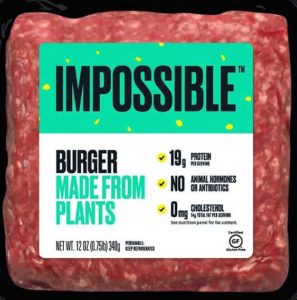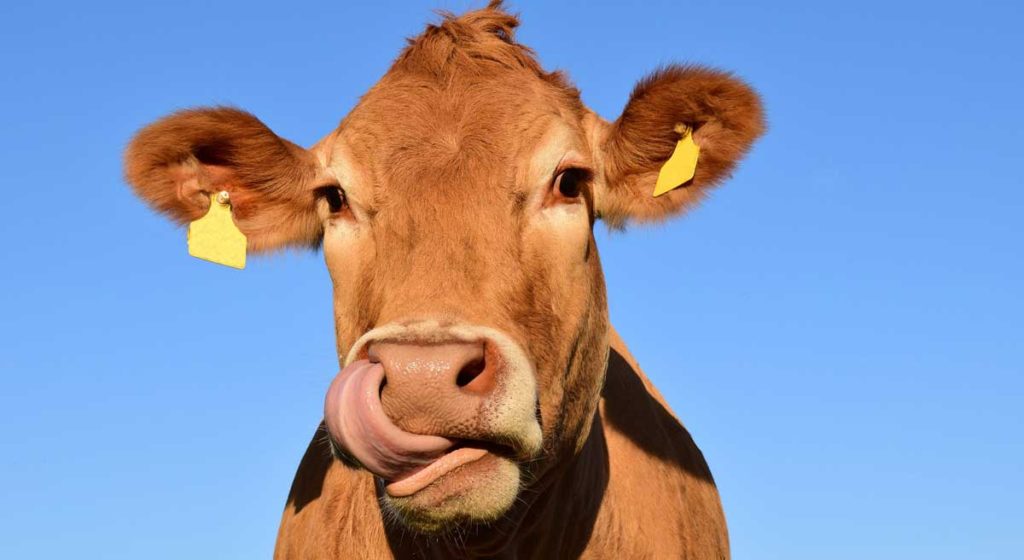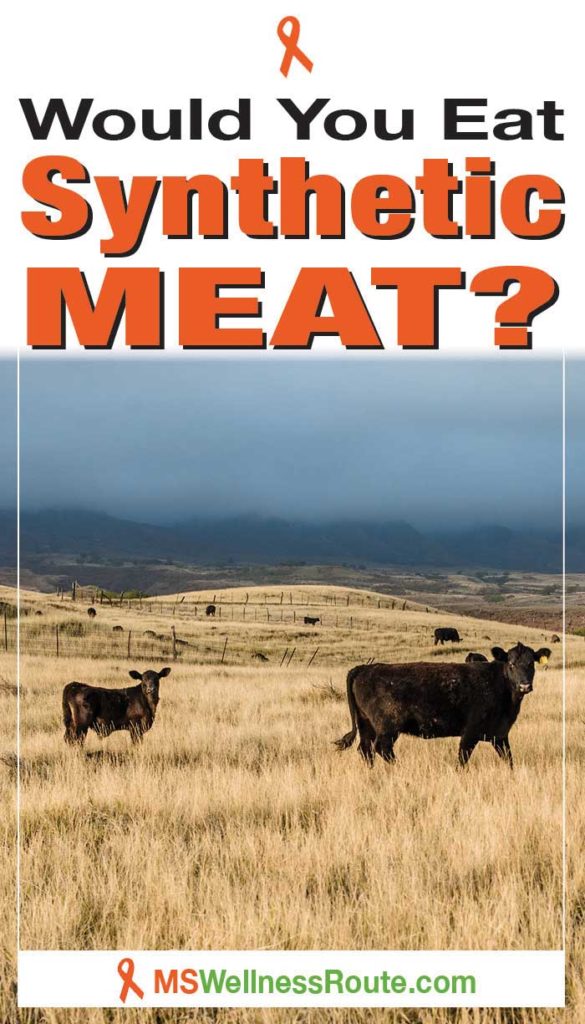Last Updated on November 22, 2023 by Cathy

To fight climate change Bill Gates wants us to start eating synthetic meat. Synthetic meat is fake meat that’s made in a laboratory. You may not realize it but some grocery stores are already selling it.
Why is Gates pushing for synthetic meat, particularly beef? He wants first-world countries, like the U.S., to push people into eating synthetic meat. He says it would save the world from climate change.
“all rich countries should move to 100% synthetic beef.” – Bill Gates
Diet plays a role in multiple sclerosis (MS). Researchers found people with MS have more bad bacteria in their gut than healthy people. How could synthetic, ultra-processed, fake meat somehow be healthier?
“Multiple sclerosis incidence and disease course are clearly influenced by environmental factors.” – PubMed
Isn’t meat from an animal that breaks down grass and turns it into nutrient-dense food better? Since Gates is an investor, is he truly interested in climate change or does he want to fatten his wallet?
Let’s break it down –
What is synthetic meat?
Cultured meat (fake meat) is meat produced by animal stem cells, instead of from living animals. Scientists harvest muscle cells from a living cow and then feed and nurture the cells. This then creates muscle tissue.
They claim “It is biologically exactly the same as the meat tissue that comes from a cow.” They’re also looking into “additive manufacturing.” They use this process in manufacturing glass, metal, plastic, and other synthetic materials. You can read more about cultured meats on Wikipedia.
Synthetic Meat Ingredients
Grocery stores have sold plant-based meats for years. Now there are synthetic/cultured meats. The Impossible Burger brand is a “plant-based” meat replacement. They claim it tastes and looks exactly like meat.

Impossible Burger is already in grocery stores for people to buy so let’s look at the ingredients. Looking at the image below, there are many ingredients I would not eat.

There are a few things that stand out to me:
- Dextrose – a refined sugar. There is a strong association between sugar and chronic diseases.
- Soy Protein Concentrate – basically defatted soy flour, used as a filler.
- Soy Leghemoglobin – short for legume hemoglobin, also known as Heme. It’s genetically modified soybeans.
Health experts promote soy as a healthy food. Processed soy is not healthy food. In the U.S. more than 90% of soybeans grown are genetically modified organisms (GMOs).
Soy and soy-derived products have estrogenic activity. Too much estrogen causes reproductive difficulties in both men and women. Plus, soy is a common allergen and it can cross-react with gluten.
Safety Concerns on Soy
Synthetic burgers are new so the long-term safety of Soy Leghemoglobin is unknown. According to the Food and Drug Administration (FDA), soy is one of the top food allergens.
Top 8 food allergens:
- Milk
- Eggs
- Fish
- Shellfish
- Tree nuts
- Peanuts
- Wheat
- Soybeans
If you decide to eat soy make sure it is organic fermented soy. Avoid genetically modified versions.
Do cows contribute to greenhouse gasses?

This is the reason Bill Gates wants everyone to start eating synthetic meat. – To lower greenhouse gasses.
The next question is – Do cows contribute to greenhouse gasses?
Researchers claim there will be less environmental impact by eating synthetic meat. That synthetic meat will improve climate control because they have:
- Fewer aquatic pollutants
- Less greenhouse gas emissions
- Uses less water
So the answer is…
Yes, cows do contribute to greenhouse gasses. But it’s how ranchers raise their cattle. Conventionally raised cows stay in confined quarters in feedlots. They eat GMO grains and soy to fatten them up.
– Which also fattens you up if you’re eating them.
Their food is poor quality and they lack exercise. Plus, they are given antibiotics to keep diseases away. Overuse of antibiotics is creating superbugs.
Have you ever driven past a feedlot?
It smells disgusting, the cows are usually standing in mud and they have mud on themselves. These feedlots destroy the soil, water, and climate. Pasture-raised cows produce healthy soil that contains living organisms.
Here is a good video explaining how ranchers could properly manage their cattle, increase profits, lower carbons, and reduce greenhouse gases.
Farmers who raise pasture-raised cows help prevent soil erosion by rotating the pasture. This allows rainwater to filter into the ground pumping carbon into the soil. This not only improves the soil but it helps to slow global warming.
“Grassland agriculture is a good way to farm and to live, the best way I know of to use and improve soil.” – Clinton P. Anderson, the U.S. Secretary of Agriculture in 1948
Would you eat lab-grown synthetic meat?
They claim the Impossible Burger is a tasty and convenient option. But, processed foods increase inflammation. MS is a chronic inflammatory demyelinating disease. You are what you eat and absorb.
Find a local rancher who raises and finishes pasture-raised, grass-fed cows. If you can’t find one in your area check out eatWILD and improve your health of you and our climate.
Eating an anti-inflammatory diet is one of the components of healing your body. The others include reducing stress, exercising, getting enough sleep, and believing you will heal.

Free Wellness Library!
Subscribe for free and I’ll send you the password to my secret library filled with many printables for your wellness journey.
Want to remember this health tip? Pin it to your favorite Pinterest board!

Resources:
https://www.ncbi.nlm.nih.gov/pmc/articles/PMC6132382/
https://en.wikipedia.org/wiki/Cultured_meat
https://en.m.wikipedia.org/wiki/Cultured_meat
https://culturedbeef.org/what-cultured-meat
https://pubmed.ncbi.nlm.nih.gov/16039550/
https://www.fda.gov/food/food-labeling-nutrition/food-allergies
Would you eat synthetic meat?





